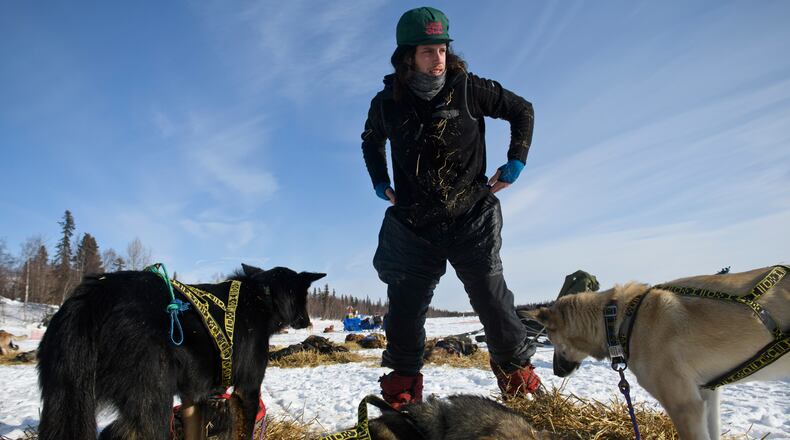Over the course of this month’s Iditarod, the nearly 1,000-mile Alaskan dogsled race, Sean Underwood had mushed through driving snow and gale force winds. The terrain was unforgiving. The trek was lonely, his companions – 14 Alaskan Huskies – not so big on conversation.
He had fought exhaustion on the world’s longest, most perilous dog walk while caring for the animals that were carrying him. And while Underwood was out there in the Alaska wild the whole world changed. When he left the start line in Anchorage on March 8, Alaska wouldn’t report its first case of coronavirus for four more days. By the time he was done, there was nowhere in the United States, no matter how already socially distant, that wasn’t overly familiar with the virus.
The greatest cruelty awaited a mere 30 miles or so from the finish in Nome. Underwood almost made it there. Soooo close, achingly close, when a condition known as overflow flooded a coastal section of the trail and bogged down him and his team. With 96% of the ordeal behind him, after 12 days on the trail, he and his dogs would not pass beneath the burled arch marking the Iditarod’s finish. Instead, they traveled the final leg aboard a rescue helicopter.
How to put that kind of crushing conclusion in terms that, say, a Georgian who might not know a dogsled from a dogleg could understand?
“I was thinking of this the other day on the way home, you know, this disappointment of not finishing the Iditarod kind of reminds me of Super Bowl LI. It’s the same feeling,” Underwood said, from his quarters near Denali National Park.
Who could have guessed it to be that awful, as deflating as the Falcons’ epic Super Bowl defeat to New England after having built a 28-3 lead? That’s the kind of analogy that could belong only to a dogsled musher originally from Tucker.
“At least it’s not an unfamiliar feeling,” Underwood said, applying the Band Aid of humor.
The 28-year-old Iditarod rookie was not alone in his disappointment. This race annually owns a high attrition rate – this year 34 finished and 23 scratched. There is no way to completely prepare for this ordeal other than to live through it. “There’s a reason that fewer than 50% of people don’t finish it on the first attempt,” said Kennesaw’s Bill Borden, who 18 years ago became the first Georgian to finish it.
The Iditarod bills itself as “The Last Great Race,” and this year it was the only race, as well. As leagues and events shut down in deference to the coronavirus, the Iditarod mushed on. It’s rather difficult to call off this game once it has started.
Even on a dogsled in the middle of the Alaska wilderness, Underwood began piecing together a pandemic’s progress. News was reaching Skwenta and Rainy Pass and Shaktoolik and all the other checkpoints so evocative of the wild. But not so wild that some of the staging areas weren’t still moved away from village centers as a health precaution.
“I was hearing a couple things on the trail, and when I heard the NBA was cancelled, that’s when my ears perked up,” Underwood said. “Then I heard the mushers were allowed to only have one handler to help ship the dogs back home. Then all my family that had planned on coming in for the finish wasn’t going to be there. I’d get all these tidbits at the checkpoints.”
(And now, even living in an area where isolation is a way of life, where the nearest gas station is 25 miles away and, as Underwood said, “to go proper shopping you have to go 140 miles north to Fairbanks,” he and his girlfriend are keeping to themselves. There may be only a few hundred or so winter residents where he lives, but, he realizes, some of them may be vulnerable.)
Credit: Marc Lester
Credit: Marc Lester
Back home outside Atlanta, where there were no other sports to follow, the quirky Iditarod became an especially big event for certain residents. Underwood’s mother, Kate, was in Alaska for the start of the race – her thought on his parting, “Oh, my God, he’s leaving for 1,000 miles on a dogsled” – but once back home the only way to chart his progress was by following a blip on a screen.
“I never thought watching a GPS tracker could be that exciting,” his mother said.
His parents found themselves falling into a musher’s routine – six hours on the race, six hours sleeping – in an attempt to keep up. His father, Jack, filled in neighbors and acquaintances from his son’s school days at St. Pius on a distant dogsled race. His mother posted updates on a Facebook page.
Their son was a big hit in Alaska. “Sean is known as the musher from Atlanta with the big hair (he has a head-full and then some),” Jack said. “He was getting a little bit of a fan following.”
The Iditarod press – if that’s what you want to call it – was on him pretty good, too, seeing how he was standing in for a legend. As a dog-handler and summer tour guide for a business owned by four-time Iditarod champion Jeff King, Underwood had run enough qualifying events to be eligible for the 2021 Iditarod. But when King required surgery just a week before this year’s race, he put his understudy on the sled.
“There was a lot of pressure because there was so much press coverage as far as him stepping in for Jeff King,” Kate Underwood said. “(King) is so well respected in that world and who is this kid? He’s his handler.”
The curiosity factor was high with this musher. How exactly, one wonders, does a kid from metro Atlanta find himself on a dogsled 4,400 miles from his birthplace?
He tried to have a typical life, he really did. He played tennis at St. Pius. Got an economics degree from Georgia Southern. “I grew up in the suburbs, I couldn’t think outside the box. All I thought was I got to graduate high school, got to go to college, got to get a degree, got to get a career, then buy a car, find a wife, get a house, have a family and plan for retirement,” he said.
But then he deviated and began to explore different worlds. He spent some time in rural Chile with family members, and a couple of summers working for an uncle, commercial fishing for salmon in Alaska. His uncle then helped line up the job working with King’s Husky Homestead company near the national park in Denali. Sometimes you stray off the paved path, and never get back on it.
Underwood discovered that he really didn’t miss the traffic on I-285 (although there can be a little dogsled bottleneck at the start of the Iditarod).
“You’re outside all day, every day. I’m working in the Alaska Range where the tallest mountain in North America is, right at the foothills. It’s an incredibly gorgeous place to train the dogs. It’s pretty easy to get lost in this world of mushing,” Underwood said.
For about a four-hour period March 20, the rugged life wasn’t so attractive. In the dark, Underwood and two other sled-dog teams entered a section of trail that they had been told hours earlier was nothing but packed snow. Instead, they got trapped in a slushy overflow of water and ice, the dogs unable to budge their load, the mushers’ boots filling with water. While it wasn’t bitterly cold – the temperature hovering around freezing – being wet was not a good idea. Underwood activated an SOS beacon, the mushers stripped off their wet clothes and hunkered down in their sleeping bags to await help. They were just outside the last checkpoint before the finish, a place ironically called Safety.
Meanwhile, back home, his parents spent four anxious hours before getting word that the stranded teams had been rescued.
“I figured there’d be some snowmobilers coming and they’d give us a ride and bring up some dry clothes. Nope,” Underwood said. “Next thing you know a Blackhawk helicopter lands, they picked us up and you feel like you’re in a war zone.”
Underwood did build some other stories to tell the tourists this summer beyond the one about the dispiriting finish.
Like part of the run from Elim to White Mountain, reaching a mountaintop only to see an approaching storm that he knew was going to be bad. “The sun was setting, and you look up on three sides around me there was coming in these dark, dark ominous clouds,” he said, picking up the story. “The sun set, the storm came in, the snow started slapping me in the face. I was having a little mental breakdown going up there, I had never seen weather like that. And I looked at the dogs and they were just single file, leaning into the wind, totally confident and unfazed. It was only me that was rattled. For the dogs it was like, finally, a challenge. They stepped up to the plate.”
(As Borden, the veteran from the 2002 race put it, “The dogs are the true athletes. The human athlete is the weak link.”)
And he’ll never forget the sunset as he was coming into Unalakleet. “It was almost all downhill,” he said. “We got good speed, there was another musher ahead of me and I could see the sun setting with his silhouette right in front of the sun. That was a pretty magical moment. And you got to that checkpoint and you had a bed waiting for you. And someone’s making pancakes and bacon.”
And he will tell his tour groups that he has another 4% of this race to rectify. Presumably the sporting calendar will be intact by next year, and he has a date circled.
“My son has some unfinished business with the Iditarod,” Jack Underwood said. “I see him crossing the finish line with his family and friends there to put their arms around him – whether that’s next year or whenever, I don’t know.”
The prize money isn’t overwhelming – the winner this year received $50,000 and a pickup truck; only the top handful of finishers get a five-figure prize. The real treasure is an accessory piece that only those who go every last frigid bit of the distance can wear.
“I’m going to do everything in my power to get in that race next year and get to the finish line and get that belt buckle,” Underwood said.
About the Author
Keep Reading
The Latest
Featured




